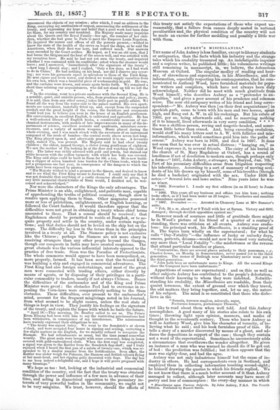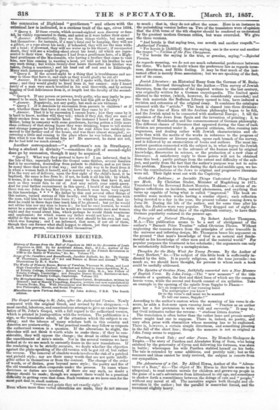AUBREY'S litiSCELLANIES. • THE name of John Aubrey is less familiar,
except to literary students or antiquaries, than the facts which his industry and the strange tales which his credulity treasured up. An indefatigable inquirer and a copious writer, he published little; his voluminous writings still remaining in manuscript, in, we believe, the Ashinelean Museum at Oxford. The singular medley of reading and hearsay, of shrewdness and superstition, in his Miscellanies, and the information, especially respecting his contemporaries, that he communicated to Anthony Wood, have furnished materials for popular writers and compilers1 which have not always been duly acknowledged. Neither did he meet with much gratitude from. Wood himself ; who describes Aubrey as a "pretender to antiquities," and gives a poor account of his prudence and common sense. The sour old antiquary writes of his friend and long correspondent—" Mr. Aubrey was then [on their first acquaintance] in sparkish garb, came to town with his man and two horses, spent high, and flung out A. W. in all his recknings. But his estate of 70011. per an. being afterwards sold, and he reserving nothing of it to himself, lived afterwards in very sorry condition. • • • ". Ho was a shiftless person, roving and magotie-headed, and sometimes little better than erased. And, being exceeding (modulo* would stuff his many letters sent to A. W. with follines and misinformations, which would sometimes guid him into the paths of errour." Aubrey was born in 1626, and died in 1697. It does not seem that he was ever in actual distress ; "hanging on?" as Wood expresses it, to several friends. The entry of his burial in the church of St. Mary Magdalene at Oxford, has a sound of loneliness if not of desolation to modern ears, though perhaps only a form—" 1697, John Aubery, a stranger' was Buryed, Jun. 7th.."' Part of his pecuniary difficulties arose from litigation respecting his inheritance. According to a sort of summary of moving accidents of his life drawn up by himself, some of his troubles (though he died a bachelor) originated with the sex. Under 1656 he notes—" Several love and law) suites." Nine years later he was no Wiser.
" 1665. November 1. I made my first address (in an ill hour) to bane Sumner.
"1666. This yeare all my business and affairs ran kim kam; nothing tooke effect, as if I had been under an ill tongue. Treacheries and enmities in abundance against me.
"1667. December — Arrested in Chancery Lane at Mrs. Sumner'e suite.
"Feb. 24 a. tn. about 8 or 9 Triall with her at Sarum. Victory and 6001. damaged ; through devilish opposition against me."
However much of sourness and little of gratitude there might be in Wood's picture of his friend of a quarter of a century s standing, there was criticism at all events. Aubrey was credulous: his principal work, his Miscellanies, is a standing proof of it. The topics turn wholly on the supernatural ; for what he, calls "Day-Fatality "—the influence of lucky or unlucky days, omens, portents, dreams—would not now be deemed very natural, any more than "Local Fatality "—the misfortunes or the reverse that attend particular families or places. "Contrariwise, there are several places unlucky to their possessors' e. Charter-house, on Mendip in Somersetahire never passed yet to the third generation. The manor of Butleigh near Glastonbury never wont yet to
the third generation. • • • "John hath been an unfortunate name to Kings. All the amend Kings since the Conquest have been unfortunate."
Apparitions of course are supernatural ; and on this as well as other subjects Aubrey has contributed to the people's delectation, without their knowing to whom they were indebted. Notwithstanding his credulity, the Miscellanies are readable, from their quaint terseness, the extent of ground over which they travel, the odd matters they bring together, and, let us say, the nature of his subject. The mind is so constituted that those who disbelieve in the " Somnia, terrorea magieoe, miracula, Nagai%
Nocturnes lemures, portentaquo Thessala,
yet like to read about them when well told. And this Aubrey accomplishes. A good many of his stories also relate to his own. times ; throwing light upon opinion manners, and modes of thought in the seventeenth century. Those who knew Aubrey as well as Anthony Wood, give him the character of veracity, of believing what he said ; and his book furnishes proof of this. He tells a story of a murder discovered by means of a ghost, and adduces the depositions in support of the case; • though they contain not a word of the supernatural. Sometimes he unconsciously adds a circumstance that overthrows the wonder altogether. He gives an instance of a man who was warned he should die if he got out of bed : the prediction was fulfilled ; but it then appears that the man was eighty-four, and had the ague.
Aubrey was not only industrious himself but the cause of industry in others. He had correspondents even in Scotland,. and employed them in collecting information touching. second-sight ; he himself drawing the queries to which his friends replied. We
i do not know that there s a much better account of it than Aubrey managed to collect, although later accounts may have more of poetry and less of commonplace : the every-day manner in which
• Miscellanies upon Various Subjects. By John Aubrey, P.R.& The Fourth Edition. Published by Russell Smith. the connexion of Highland " gentlemen " and others with the Criminal law is indicated, is a curious trait of the age, circa 1694. "Query 4. If these events,which second-sighted men discover or foretel, be visibly represented to them and acted as it were before their eyes ? "Answer. • Affirmatively, they see those things visibly, but none sees but themselves : for instance, if a man's fatal end be hanging, they will see a gibbet, or a rope about his neck; if beheaded, they will see the man without a head; if drowned, they will see water up to his throat ; if unexpected death, they will see a winding-sheet about his head,. all which are represented to their view. One instance I had from a gentleman here, of a Highland gentleman of the Macdonalda' who having a brother that came to visit him, saw him coming in wanting a head, yet told not his brother he saw any such thing; but within twenty-four hours thereafter his brother was taken, (being a murderer,) and his head out off and sent to Edinburgh. Many such instances might be given. "Query 5. If the second-sight be a thing that is troublesome and uneasy to those that have it, and such as they would gladly be rid of? "Answer. It is commonly talked by all I spoke with, that it is troubleseine; and they would gladly be freed from it, but cannot : only I heard lately of a man very much troubled in his soul therewith, and by serious begging of God deliverance from it, at length lost the faculty of the secondsight
"Query 6. If any person or persons, truly godly, who may justly be presumed to be such, have been known to have had this gift or faculty ?
"Answer. Negatively, not any godly, but such as are virtuous. "Query7. If it descends by succession from parents to children ? or if not, whether those that have it can tell how they came by it? " Answer. That it is by succession I cannot learn • how they came by it is hard to know, neither will they tell; which if they did, they are sure of their strokes from an invisible head. One instance I heard of one Allen Miller, being in company with some gentlemen having gotten a little more than ordinary of that strong liquor they were drinking, began to tell stories and strange passages he had been at; but the said Allen was suddenly removed to the farther end of the house, and was there almost strangled ; recovering a little and coming to the place where lie was before they asked him what it was that troubled him Jo? Ile answered, he thirst not tell, for he had told too much already."
Another correspondont--" a gentleman's son in Strathspey, being a student in divinity "—considers the gift of second-sight -does go by succession, though it may be acquired.
"Query 7. What way they pretend to have it ? I am informed, that in the Isle of Sky, especially before the Gospel came thither, several families had it by succession, descending from parents to children, and as yet there be many there that have it that way and the only way to be freed from it is when a woman hath it herself, and' is married to a man that halls it also : if in the very act of delivery, upon the first sight of the child's head, it be baptized, the same is free from it; if not, he bath it all his life : by which, it !teems, it is a thing troublesome and uneasy to them that have it, and such as they would fain be rid of. And may satisfy your ninth query. And for your farther contentment in this query, I heard of my father, that there was one John du beg Mac Grigor, a 'Renault man born, very expert in this knowledge. • • • * My father by this and several other things of this nature, turned curious of this faculty, and being very intimate with the man, told him he would fain learn it ; to which he answered, that indeed he could in three days time teach him if he pleased ; but yet he would not advise him nor any man to learn it ; for had he once learned, he would never be a minute of his life but he would see innumerable men and women night and day round about him, which perhaps he would think wearisome and unpleasant; for which reason my father would not have it. But as skilful as this man was, yet he k-new not what should be his own last end, which was hanging ; and I am informed, that most, if not all of them, though they can foresee what shall happen to others, ,yet they cannot forei tell, much less prevent, what shall befall themselves.'



























 Previous page
Previous page